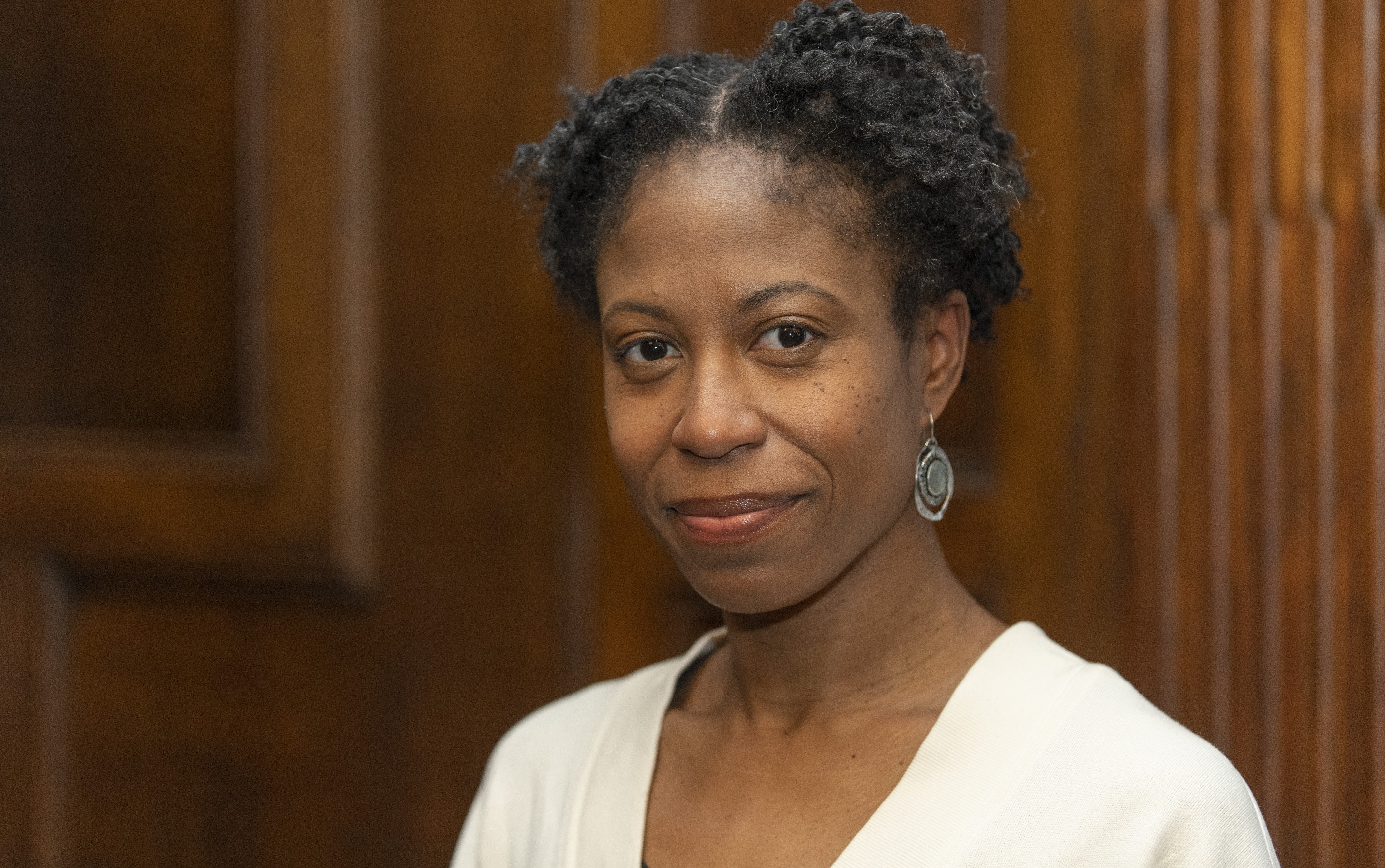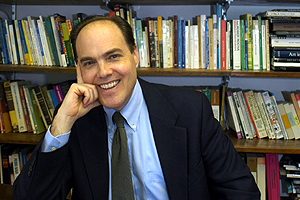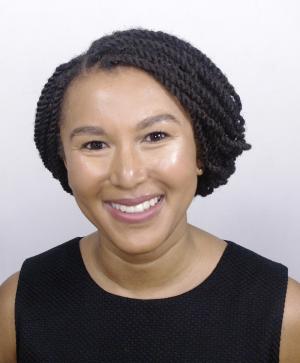
Princeton University, PhD '95
BIOGRAPHY
I am a professor in History, the College, and the Law School. My most recent book, White Fright: The Sexual Panic at the Heart of America's Racist History (Basic Book, 2020), concerns race, sex, and the civil rights movement from emancipation to the present. My next most recent book is Building the American Republic, Volume 2: A Narrative History From 1877 (Chicago, 2018). Both volumes are free in e-book form.
My work has revolved around the relationship between race, sex, and politics in the post-Emancipation South. My first book, Before Jim Crow: The Politics of Race in Postemancipation Virginia (North Carolina, 2000), analyzed the conditions that facilitated and, ultimately, undid interracial democracy in the post–Civil War South. An edited collection with Glenda E. Gilmore and Bryant Simon, Jumpin' Jim Crow: Southern Politics from Civil War to Civil Rights (Princeton, 2000), continued the theme of African American resistance to white domination from Reconstruction through the 1950s. A third book, The Age of Jim Crow: A Norton Documentary History (Norton, 2008), examines the creation and dissolution of legal segregation in America through primary sources.
My awards include fellowships from the American Council of Learned Societies, the American Academy in Berlin, the Alphonse Fletcher Foundation, and the John Simon Guggenheim Memorial Foundation.
Recent Research / Recent Publications
- White Fright: The Sexual Panic at the Heart of America's Racist History. New York: Basic Book, 2020.
- Building the American Republic, Volume 2: A Narrative History from 1877. Chicago: University of Chicago, 2018.
- "The Theology of Unionism and Anti-Unionism." Labor: Studies in Working-Class History of the Americas 14, no. 1 (Mar. 2017): 83–85.
- Senior editor for legal history, Oxford Research Encyclopedias: American History, edited by Jon Butler. Oxford: Oxford University Press, 2013–present.
- "Is Marriage a Civil Right? The Politics of Intimacy in the Jim Crow Era." In The Folly of Jim Crow: Rethinking the Segregated South, edited by Stephanie Cole and Natalie J. Ring, 176–208. College Station: Texas A&M Press, 2012.
- "The Civil Rights Movement in the South." In Speaking Out With Many Voices: Documenting American Activism in the 1960s and 1970s, edited by Heather Ann Thompson. Upper Saddle River, NJ: Prentiss Hall, 2008.
- "Fighting Hitler and Jim Crow: African Americans and World War II." The Berlin Journal (Fall 2005): 27–30.
- "The Theology of Massive Resistance." In Massive Resistance, dited by Clive Webb, 151–80. New York: Oxford University Press, 2005.
- "Sex, Segregation, and the Sacred After Brown." Journal of American History 91, no. 1 (June 2004): 119–44.
- "The Congress and White Supremacy, 1860s-1920s." In The American Congress: The Building of Democracy, edited by Julian E. Zelizer, 250–67. Boston: Houghton-Mifflin, 2004.
- "The Sexual Politics of Race in WWII America." In Mobilizing the Movement, edited by Kevin Kruse and Stephen Tuck. New York: Oxford University Press, 2011.Before Jim Crow: The Politics of Race in Post-Emancipation Virginia. Chapel Hill: University of North Carolina Press, 2000.
- "The Limits of Liberalism in the New South: The Politics of Race, Sex, and Patronage in Virginia" and "Introduction." In Jumpin' Jim Crow: Southern Politics from Civil War to Civil Rights, edited by Jane Dailey, Glenda Gilmore, and Bryant Simon, 3-6, 88–114. Princeton, NJ: Princeton University Press, 2000.
- "Deference and Violence in the Postbellum Urban South: Manners and Massacres in Danville, Virginia." Journal of Southern History 63 (August 1997): 53–90.
- Laura Kipnis's Unwanted Advances: Sexual Paranoia Comes to Campus, Christian Century (Oct. 9, 2017).
- Timothy B. Tyson's Blood Done Sign My Name. Chicago Tribune (May 30, 2004).
- Steven Hahn's A Nation Under Our Feet. Chicago Tribune (February 22, 2004).
- "The Last Time We Fought a Preemptive War in the Middle East." Huffington Post (Dec. 1, 2017).
- "Gerrymandering Is a Threat to Our Republic." Huffington Post (Oct. 3, 2017).
- "Remembering our KKK Past." Huffington Post (Sept. 12, 2017).
- "The Confederate General Who Was Erased from History." Huffington Post (Aug. 21, 2017).
- Discusses the American South's geographic boundaries with Business Insider
- Published Building the American Republic, Volume 2: A Narrative History from 1877
- Discusses Confederate Statues on NPR with James Grossman
- Named an OAH Distinguished Lecturer
- Discusses Presidential Primaries with Robin Young on Public Radio [audio, 9 mins.]
- Delivers Constitution Day Lecture on "Sex, Race, and the 14th Amendment" at Carthage College, Wisconsin [video, 86 mins.]
- "Obama's Omission." Chicago Tribune (July 30, 2008).

Yale University, PhD '90
BIOGRAPHY
Amy Dru Stanley is a historian of the United States, with particular interest in law, capitalism, freedom and unfreedom, human rights, the relationship between the household and economic life, and the historical experience of moral problems. Her work has appeared in scholarly books and journals, as well as in the New York Times, the Washington Post, the Nation, Dissent, Slate, and Jacobin. She has received the Quantrell Award for Excellence in Undergraduate Teaching and the Faculty Award for Excellence in Graduate Teaching and Mentoring. In 2018, she was the jury chair for the Pulitzer Prize in history.
Recent Research / Recent Publications
The Antislavery Ethic and the Spirit of Commerce: An American History of Human Rights. Cambridge, MA: Harvard University Press, forthcoming.
From Bondage to Contract: Wage Labor, Marriage and the Market in the Age of Slave Emancipation. Cambridge: Cambridge University Press, 1998.
- Frederick Jackson Turner Prize, 1999. (For the best first book in US History, awarded by the Organization of American Historians.)
- Morris D. Forkosch Award, 1999. (For the best book in intellectual history.)
- Avery O. Craven Award, 1999. (For the best book on the era of the Civil War and Reconstruction, awarded by the Organization of American Historians.)
- Frederick Douglass Prize, 1999, honorable mention. (For the best book on the history of slavery.)
- “The Free Sea: An Antislavery Idea of Human Rights,” in Cambridge History of Human Rights, edited by Jennifer Pitts and Daniel Edelstein, 2025.
- "The Sovereign Market and Sex Difference: Human Rights in America." In American Capitalism: New Histories, edited by Sven Beckert and Christine Desan. New York: Columbia University Press, 2018.
- "Histories of Capitalism and Sex Difference." Journal of the Early Republic 36, no. 2 (Sum. 2016).
- "Slave Emancipation and the Revolutionizing of Human Rights." In The World the Civil War Made, edited by Greg Downs and Kate Masur. Chapel Hill: University of North Carolina Press, 2015.
- “Contract.” In Keywords for American Cultural Studies, 2nd ed., edited by B. Burgett and G. Hendler. New York: New York University Press, 2014.
- "Slave Breeding and Free Love: An Antebellum Argument over Slavery, Capitalism, and Personhood." In Capitalism Takes Command, edited by Michael Zakim and Gary Kornblith. Chicago: University of Chicago Press, 2012.
- "Instead of Waiting for the Thirteenth Amendment: The War Power, Slave Marriage, and Inviolate Human Rights." American Historical Review 115, no. 3 (June 2010).
- "When We Were Young." In Wayne F. Miller: Photographs 1942–1958, edited by Stephen Daiter. Brooklyn: Powerhouse Books, 2008.
- "Wages, Sin, and Slavery: Some Thoughts on Free Will and Commodity Relations." Journal of the Early Republic 24 (Sum. 2004).
- "Dominion and Dependence in the Law of Freedom and Slavery." Law & Social Inquiry 28, no. 3 (Aut. 2003).
- "Marriage, Property, and Ideals of Class." In Blackwell's Companion to American Women's History, edited by Nancy Hewitt. Oxford: Blackwell Press, 2002.
- "The Right to Possess All the Faculties that God Has Given: Possessive Individualism, Slave Women, and Abolitionist Thought." In Moral Problems in American Life, edited by Lewis Perry and Karen Halttunnen. Ithaca, NY: Cornell University Press, 1999.
- "'We Did Not Separate Man and Wife, But All Had to Work': Freedom and Dependence in the Aftermath of Slave Emancipation" in Terms of Labor: Slavery, Serfdom, and Free Labor, edited by Stanley Engerman, Stanford University Press, 1999.
- "Home Life and the Morality of the Marketplace: Slavery and Freedom, Women and Men." In The Market Revolution in America, edited by Melvyn Stokes. Charlottesville: University of Virginia Press, 1996.
- "Beggars Can't Be Choosers: Compulsion and Contract in Postbellum America." Journal of American History 78, no. 4 (Mar. 1992).
- "Conjugal Bonds and Wage Labor: Rights of Contract in the Age of Emancipation." Journal of American History 75, no. 2 (Sept. 1988).
- Writes "Freedom for Sale" for Dissent Magazine on academic freedom and American history teaching
- Quoted in the Globe and Mail article, "Donald Trump has taken aim at what he calls the ‘woke’ view of American history"
- Quoted in the NYT article, "Juneteenth Reminds Us to Think About Economic Freedom, Not Just Legal Liberty"
- Quoted in the Washington Post on polarization, the history of race in the US, and the GOP
- Comments on the Florida Board of Education's guidelines on teaching Black history in Newsweek
- Co-writes with Craig Becker for the New York Times on Amazon's opposition to mail-in ballot unionization votes
- Writes for the Washington Post on the Commerce Clause and pandemic liability protection for businesses
- Quoted in the Burlington Free Press on the history of the Confederate Flag
- Quoted in the Pittsburgh Post-Gazette on the meaning of Chicago 1968
- Chairs 2018 Pulitzer Prize for History Jury
- Writes for Slate on the abolition of slavery, theatergoing, and the right to happiness
- Named an OAH Distinguished Lecturer
- Kyle Volk, PhD'08, Praises Stanley's Scholarship on the Oxford University Press blog
- Participates on Yale Panel on the 14th Amendment
- Amy Dru Stanley and Jonathan Levy Embark on New Study of the Economy
- Coorganizes "Human Trafficking, Labor Migration, and Migration Control in Comparative Historical Perspective" conference, Pozen Family Center for Human Rights
- Writes for the New York Times Opinionator blog on the Civil War Enlistment Act

Harvard University, PhD '05
BIOGRAPHY
A deep and abiding interest in the interactions between Asian Americans and African Americans drives my first book manuscript. Focusing primarily on the home front culture of World War II, but utilizing the necessary bookends of the Popular Front of the 1930s and the Cold War of the 1950s, my monograph interrogates the ways in which different racialized and ethnic groups interacted during a heightened sense of possibility for an American multiracial democracy. Unpublished diaries of incarcerated Japanese American, Charles Kikuchi, serve as a narrative through-line for the manuscript—he wrote every day of his life, from the bombing of Pearl Harbor until his death in 1988. While Kikuchi can be considered one of a handful of radical Nisei (second-generation) intellectuals consumed by the constitutional violation of Japanese Americans, he was most deeply concerned with the welfare of African Americans and other oppressed minorities. Recognition of their equality by the rest of the nation would prove key to the fulfillment of democracy at home and abroad. My book therefore considers prototypes for Kikuchi, like Karl Yoneda, a highly visible Communist Party member during the Popular Front, intellectual mentors during the war, such as immigrant activist Louis Adamic, W.I. Thomas, and Dorothy Thomas, social scientists associated with, respectively, the Chicago school of sociology and Japanese evacuation and resettlement study, and “everyday people,” from African Americans on the South Side of Chicago to Filipino migratory farm laborers in central California. The Cold War closes off some of the interracial and democratic possibilities of this fertile intellectual era, but not before a constellation of radical counterpublics appear on the national and international maps. A cartography of this period, therefore, demonstrates not only the importance of reexamination of the Kikuchi diaries, but also the efforts and limits of these particular publics to repossess, reclaim, and redefine American democracy.
I have been honored to be a dissertation fellow at the Charles Warren Center for Studies in American History, and an Andrew W. Mellon Foundation Postdoctoral Fellow. Prior to Chicago, I taught at Harvard, Princeton, Columbia, and most recently, the University of Michigan.
Recent Research / Recent Publications
- “Filipino Grief in Five Acts.” Amerasia Journal, (2024), 1–7.
- "Race (& Love) Matter More Than Ever Now: Affirmative Action, Alliances, and Anti-Asian Hate.” In Prophetic Leadership and Visionary Hope: New Essays on the Work of Cornel West. Edited by Barbara Will. Philadelphia: University of Pennsylvania Press, 2023: 161-177.
- Jim and Jap Crow: A Cultural History of 1940's Interracial America. Princeton, NJ: Princeton University Press, 2012.
- "Charles Kikuchi's 'American Dilemma': African Americans in the Unpublished Diaries of a Nisei Intellectual." In Journey into Otherness: Essays in North American History, Culture and Literature, 191–203. Edited by Ada Savin. Amsterdam: VU Press, 2005.
- "Hardly 'Small Talk': Discussing Race in the Writing of Hisaye Yamamoto." Prospects: An Annual of American Cultural Studies 29 (2005): 435–72.
- "The Unpublished Diaries of Charles Kikuchi: 'Black and Yellow' through the Eyes of a Progressive Nisei Intellectual." Prospects: An Annual of American Cultural Studies 28 (2004): 383–47.
- "Call-and-Response: Tracing the Ideological Shifts of Richard Wright through His Correspondence with Friends and Fellow Literati." African American Review 37, no. 1 (spring 2003): 53–64.
- Interviewed on The Course Podcast, Episode 28, "How do People Get Along?"
- Discusses baseball and African American culture with the New York Times
- Discusses the connection between racism and violent attacks
- Discusses baseball, race, and history with the alumni magazine
- Delivered 2015 Harper Lecture on "Illusion Fields: Baseball and US History" [video; go to 12.40 minutes beginning of lecture; total video 73 minutes]
- Awarded 2015 Quantrell Award for Excellence in Undergraduate Teaching Excellence in Undergraduate Teaching
- BookTV (CSPAN2) conversation with Cornel West at Harlem's Hue-Man Bookstore, May 2012.
- "Just a Friendly Game." Interview with Desmond Nakano, director of White Man's Burden (1995) and American Pastime (2007). Nakano's latest film revisits the Japanese American incarceration through the lens of camp league baseball games, jazz-band swinging, and interracial romance. From Cinevue: Program for the Asian American International Film Festival, 2007.

New York University, PhD '10
BIOGRAPHY
Rashauna Johnson is a historian of the 19th-century African diaspora, with an emphasis on slavery and emancipation in the US South and Atlantic World. She is especially interested in the limits and possibilities of archival histories of enslaved and freed people and the worlds in which they labored and lived. Johnson teaches courses on race, slavery, and nation; methodologies of slavery studies; and the 19th-century US.
Johnson is the author of Slavery’s Metropolis: Unfree Labor in New Orleans during the Age of Revolutions (Cambridge UP, 2016; paperback 2018), which was awarded the 2016 Williams Prize for the best book in Louisiana history and the 2018 H. L. Mitchell Award by the Southern Historical Association for the best book on the southern working class. Slavery's Metropolis was also named a finalist for the 2016 Berkshire Conference of Women's Historians Book Prize, honorable mention for the Urban History Association's Kenneth Jackson Award, and a finalist for the 2017 Frederick Douglass Book Prize. Her second book, a forthcoming study of family, race, and region in rural Louisiana, will be published by Cambridge University Press. That project has been supported by the Hutchins Center for African & African American Research at Harvard University, the Mellon Scholars Post-Doctoral Fellowship in African American History at the Library Company of Philadelphia, and The Gilder Lehrman Institute of American History. In addition, she is a coeditor of The Cambridge History of the African Diaspora.
Johnson serves extensively within and beyond the profession. She has been a member of several book prize committees, including Wesley-Logan (AHA), David Montgomery (OAH), and Harriet Tubman (Schomburg), as well as program and fellowship committees. She is an OAH Distinguished Lecturer, a member of the Omohundro Institute Council, and a former board member of the Association for the Study of the Worldwide African Diaspora (ASWAD). Consistent with her commitment to engaged scholarship beyond the profession, Johnson regularly delivers lectures to public and private high schoolers, and she has taught GED and literature courses in correctional facilities.
Johnson grew up in New Orleans, Louisiana. She earned a BA in Afro-American Studies and political science from Howard University, where she graduated summa cum laude and Phi Beta Kappa. She earned a PhD in history from New York University. Her graduate studies were supported in part by the Andrew Mellon Predoctoral Fellowship in the Humanistic Studies, and her dissertation received NYU’s 2011 Dean's Outstanding Dissertation Award in the Humanities. She is also the recipient of the Drusilla Dunjee Houston Award given by the Association of Black Woman Historians. She taught in the history department at Dartmouth College for nine years, where she directed the foreign study program in London (2017) and the honors program (2019-20). She was also affiliated with the Program in African and African American Studies (AAAS), and served on the advisory board for the Mellon Mays Undergraduate Fellowship (MMUF) Program.
Recent Research / Recent Publications
-
Slavery’s Metropolis: Unfree Labor in New Orleans during the Age of Revolutions. Cambridge University Press, 2016 (paperback 2018).
-
Downs, Jim, ed., with Rhae Lynn Barnes, Henry Louis Gates Jr., Rashauna Johnson, and John Stauffer, with Faith Smith and Nii Ayikwei Parkes, “A Novel as Archive: A Roundtable on Frances E. W. Harper’s 1892 Novel, Iola Leroy, about the Civil War and Reconstruction.” Civil War History 69, no. 4 (December 2023): 65-91.
-
“Settlers, Slavery, and the Early Republic.” William and Mary Quarterly, 3d ser., 78, no. 2 (April 2021): 235–42.
-
“Spectacles of Restraint: Race, Excess, and Heterosexuality in Early American Print Culture.” In Heterosexual Histories, eds. Rebecca Davis and Michele Mitchell. New York: NYU Press, 2021.
-
“Les études sur l’esclavage: défis et opportunités méthodologiques,” trans. Emmanuel Roudaut, Revue d’histoire du XIXe siècle 57 (2018): 128-30.
-
“From Saint-Domingue to Dumaine Street: A Family Story of Atlantic Circulations and Great Migrations,” Journal of African American History 102, no. 4 (Fall 2017): 427-43.
-
“A Fragile Empire? Early American Expansion from Below,” Reviews in American History 44, no. 3 (September 2016): 411-417.
-
“Visibility Versus Voice: Enslaved Women in U.S. History and Memory,” Reviews in American History 41, no. 2 (June 2013): 238-245.
-
“‘Laissez les bons temps rouler!’ and Other Concealments: Households, Taverns, and Irregular Intimacies in Antebellum New Orleans.” In Interconnections: Gender and Race in American History, edited by Alison M. Parker and Carol Faulkner, 19-50. Rochester: University of Rochester Press, 2012 (paperback 2014).
-
“Streets and Archives: Slavery and the Spaces of Early New Orleans,” Process History: The Blog of the Organization of American Historians (OAH), April 5, 2017.
-
“Slavery, New Orleans, and the Counting Blues,” Black Perspectives, African American Intellectual History Society (AAIHS), www.aaihs.com, March 28, 2017.
-
“Slavery’s Metropolis: The Place of Enslaved People in a Revolutionary Age,” Age of Revolutions, ageofrevolutions.com, February 27, 2017.
-
As Historians Gather, No Truce in the History Wars, NYT, January 8, 2023
-
Marc Parry, “How Should We Memorialize Slavery? A Case Study of What Happens When Research Collides with Public Memory,” The Chronicle Review of The Chronicle of Education, September 15, 2017.
-
“Raquettes in New Orleans,” Tripod: New Orleans at 300, WWNO Radio Interview, January 2016.

Harvard University, PhD '99
BIOGRAPHY
I am a historian of inequality and its persistence. I specialize in the study of Brazil and Latin America, and focus particularly on informality, cities, citizenship, law, migration, race, slavery and its afterlives.
My first book, A Poverty of Rights (Stanford, 2008), examines how weak citizenship rights and residential informality came to define urban poverty, popular social struggles, and the political dynamics of inequality in modern Brazil. It received book awards from the Social Science History Association, the Urban History Association, the Conference on Latin American History, and the Brazilian Studies Association.
A volume I coedited with Bryan McCann and Javier Auyero, Cities from Scratch (Duke, 2014), explores the many ways in which poverty and informality have shaped the Latin American urban experience. My essay, "A Century in the Present Tense," explores the intellectual history of the informal city, arguing that slums and shantytowns are dynamic historical phenomena in their own right rather than perpetual symptoms of current crises. In various other essays and ongoing research, I have focused on informality's relationship to developmentalism and political liberalism, slavery, racial inequality in law and urban space, criminal law, internal migrations, and the relationship between the urban poor and Brazil’s political left.
Along with Brazilian historian Keila Grinberg, I have edited a volume entitled The Boundaries of Freedom, which brings together essays by leading Brazilian and Brazilianist scholars of slavery and its afterlives. My own essay, “Slavery, Freedom and the Relational City,” focuses on how unfreedoms born of slavery continued to bind urban free and freedpeople during Brazil’s age of abolition.
My current book, Intimate Inequalities: Urbanism, Slavery, and Bounded Freedom in a Brazilian City, explores the historical co-evolution of urbanism and informality. The book is based in Recife, Brazil, a northeastern city that came to be seen as both the capital of Brazilian underdevelopment and the incubator of some of the country's most innovative social and cultural movements. Recife originated as a slave city, and the social and power relations that had sustained slavery continued to structure it long after abolition in 1888. Like many other cities across the globe, Recife evolved as a place where modern technologies, economies, and liberal institutions coexisted with and depended upon urban informality. Formal institutions and economies were embedded in an essentially relational city, in which personal connections mediated economic and political life and deep inequality structured vital (and often violent) intimate interdependencies. In the twentieth century, relational power proved remarkably adaptable, inhabiting liberal institutions and radical social movements, structuring "political society," and doing much to explain both social mobility and inequality's resilience. In exposing the microhistory of this phenomenon in Recife, I explore the emergence of urban informality as part and parcel of modern governance and bring into a focus a paradigm of urban modernity that shapes city life across the globe.
Other ongoing projects focus on the "Rights to the City" movement in law, political philosophy, and practice; and the global history of urban informality through a collaborative project entitled "La Ville informelle au XXe siècle: politiques urbaines et administration des populations."
At Chicago, I am part of the Faculty Advisory Committees for the Mansueto Institute for Urban Innovation, the Art and Architecture Committee and the Latin America Faculty Working Group; and I am a Faculty Affiliate at the Center for Latin American Studies and the Center for the Study of Race, Politics, and Culture. Outside of the University, I serve on the editorial boards of Past & Present and the Journal of Latin American Studies, as well as the international Advisory Committee for the Centro de Estudos da Metrópole in São Paulo and the board of the Urban History Association. My teaching focuses both on my core research interests and on the larger histories of Brazil, Latin America, cities, and social inequality. Before coming to Chicago, I taught at Amherst College and Northwestern University.
Recent Research / Recent Publications
- The Boundaries of Freedom: Slavery, Abolition, and the Making of Modern Brazil, co-edited with Keila Grinberg. Cambridge University Press, 2022.
- Cities from Scratch: Poverty and Informality in Urban Latin America, co-edited with Bryan McCann, and Javier Auyero. Durham, NC: Duke University Press, 2014.
- A Poverty of Rights: Citizenship and Inequality in Twentieth-Century Rio de Janeiro. Stanford: Stanford University Press, 2008 (paperback, 2011).
- The Boundaries of Freedom: Slavery, Abolition, and the Making of Modern Brazil, co-edited with Keila Grinberg, in production, Cambridge University Press.
- “Historicizing Informal Governance in 20th Century Brazil,” Contemporary Social Science, May 2021.
- "A ética do silêncio racial no contexto urbano: políticas públicas e desigualdade social no Recife, 1900-1940," Anais do Museu Paulista, 28 (2020): 1-45.
- “From the Mocambo to the Favela: Statistics and Social Policy in Brazil’s Informal Cities,” Histoire et Mesure 34, no. 1 (2019): 15-40.
- “Favelas and Politics in Brazil, 1890-1960,” in William Beezley, ed., Oxford Research Encyclopedia, Latin American History, Oxford University Press, 2019.
- "Urban Informality and the Paradoxes of Developmental State Building," in State and Nation Making in Latin America and Spain: The Rise and Fall of the Developmental State, edited by Miguel Centeno and Agustín Ferraro. Cambridge: Cambridge University Press, 2018.
- "Ethos and Pathos in Millennial Brazil." Latin American Research Review 53, no. 2 (June 2018): 394–402.
- "Law, Silence and Racialized Inequalities in the History of Afro-Brazil," with Keila Grinberg and Hebe Mattos. In Afro-Latin American Studies: An Introduction, edited by Alejandro de la Fuente and George Reid Andrews. Cambridge: Cambridge University Press, 2018, 130–78.
- "Beyond Insurgency and Dystopia: The Role of Informality in Brazil’s Twentieth-Century Urban Formation." In Public Goods versus Economic Interests: Global Perspectives on the History of Squatting, edited by Freia Anders and Alexander Sedlmaier. New York: Routledge, 2016, 122–49.
- "The Red Menace Reconsidered: A Forgotten History of Communist Mobilization in Rio's Favelas, 1945–1964." Hispanic American Historical Review 94, no. 1 (2014): 1–33.
- "Urban History." In Oxford Bibliographies Online (2013)
- "Democracy, Thuggery, and the Grassroots: Antoine Magarinos Torres and the União dos Trabalhadores Favelados in the Age of Carioca Populism." Nuevo Mundo–Mundos Nuevos, Colloquium: "Repensando los populismos en América Latina," February 2013.
- "Partindo a cidade maravilhosa" (Dividing the Marvelous City). In Quase cidadão: histórias e antropologias da pós-emancipação no Brasil, edited by Flávio dos Santos Gomes and Olívia Maria Gomes da Cunha. Rio de Janeiro: Editora da Fundação Getúlio Vargas, 2007, 419–50.
- "Direitos por lei, ou leis por direito?" (Rights by Law or Laws by Right?). In Direitos e justiças no Brasil: Histórias plurais, edited by Silvia Lara and Joseli Mendonça, 417–56. São Paulo: UNICAMP Press, 2006.
- "Slandering Citizens: Insults, Class and Social Legitimacy in Rio de Janeiro's Criminal Courts." In Honor, Status, and the Law in Modern Latin America, edited by Sueann Caulfield, Lara Putnam, and Sarah Chambers, 176–200. Durham, NC: Duke University Press, 2005.
- "Quase Pretos de Tão Pobres? Race, Class, and Criminal Justice in Rio de Janeiro." Latin American Research Review 39, no. 1 (February 2004): 31–59.
- Profiled on BBS Brasil on teaching Brazilian history
- Part of the core team of La Ville informelle au XXe siècle
- Discusses contemporary urban studies with Marco Garrido, Dialogo, Winter 2018
- Discusses Urban Poverty in Latin America [video, 3 minutes]

Stanford University, PhD '86
Prof. Borges has retired and no longer directs BA theses or accepts new graduate students.
BIOGRAPHY
Dain Borges works on nineteenth- and twentieth-century Latin American culture and ideas. His current research project, "Races, Crowds, and Souls in Brazilian Social Thought, 1880–1920," centers on the ways in which Brazilian intellectuals used race sociology and social psychology to understand popular religion and politics. He teaches seminars and courses on Latin American history, comparative nineteenth-century transformations, ideologies of national identity, and culture in the African diaspora.
Recent Research / Recent Publications
-
“Mockery and Piety in Eça de Queirós and Machado de Assis.” Revista de Estudos Literários [Coimbra] (2016).
-
“Catholic Vanguards in Brazil.” In Local Church, Global Church: Catholic Activism in Latin America from Rerum Novarum to Vatican II, edited by Stephen J. C. Andes and Julia G. Young. Washington, DC: Catholic University of America Press, 2015.
-
"Healing and Mischief: Witchcraft in Brazilian Law and Literature, 1890–1922." In Crime and Punishment in Latin America, edited by Carlos Aguirre, Gilbert Joseph, and Ricardo Salvatore. Durham, NC: Duke University Press, 2001.
-
Esau and Jacob, by Machado de Assis. New York: Oxford University Press, 2000 (editor).
-
"A Mirror of Progress." In The Brazil Reader: History, Culture, Politics, edited by Robert M. Levine and John J. Crocitti. Durham, NC: Duke University Press, 1999.
-
"Intellectuals and the Forgetting of Slavery in Brazil." Annals of Scholarship 11 (1996).
-
"The Recognition of Afro-Brazilian Symbols and Ideas, 1890–1940." Luso-Brazilian Review 32 (1995).
-
"Puffy, Ugly, Slothful, and Inert: Degeneration in Brazilian Social Thought, 1880–1940." Journal of Latin American Studies 25 (1993).
-
The Family in Bahia, Brazil, 1870–1945. Stanford: Stanford University Press, 1992.
-
Discusses "Natural Disasters and Social Responses" at the Summer Teacher Institute, University of Chicago [video, 50 mins]

Brown University, PhD '88
BIOGRAPHY
The primary national focus of my research is modern France, but I have found myself intrigued by research problems best treated transnationally. My most recent book, Cultural Revolutions, moves across the Atlantic world from Britain, to colonial and early national America, and finally eastwards again to France. My ongoing pair of projects, Strangers at Home and Conundrums of Commemoration, stay on the European continent but involve a comparative analysis of Paris and Berlin in the twentieth century. Finally, although I have not yet published extensively in this area, I maintain an active interest in and regularly teach the history of European colonialism and the postcolonial world it left behind.
Conceptually, my work focuses on the intersection of material culture, everyday life, and politics. I seek to explain how and why everyday things have become catalysts for conflict, means of expressing identities and constructing selves, vehicles for dissenting opinions, and sites of unexpected state intervention. My research agenda is based on the hypothesis, informed by phenomenology and feminist theory, that key to answering these questions is the close and careful study of material culture, but a close and careful study that always links the concreteness of everyday goods to the abstractions of polity, society, and economy.
Although the courses I offer are necessarily broader and more general than this research agenda, they have been systematically informed by it. I use material and well as visual and textual sources in virtually all my classes, and nearly all are transnational in reach.
TEACHING
Undergraduate courses (selected)
-
Problems in Gender Studies
-
Europe 1930 to the present
-
Colonizations Civ III
-
Jewish Civ III
-
Modern Jewish History
-
Cultural Revolutions
Graduate courses (selected)
-
Seminar: Religion, Politics and Society in Modern Europe (with John Boyer)
-
Everyday Life in Modern Europe (with Sheila Fitzpatrick)
-
Seminar: The Politics of Memory in France and Germany (with Michael Geyer)
-
Gender in Europe (with Susan Gal)
-
Seminar: Race, Racism and and Anti-Racist Movements in Modern Europe
Recent fields for general examinations
-
Modern European History
-
Modern French History
-
Gender History and Theory
-
Culture and Politics in Modern Europe
-
European Social History
Titles of some recent (or current) AB and AM theses and PhD dissertations
-
Islam and the Republic: A Study of the Effects of the Algerian Civil War on French Understandings of Islam
-
Female Action and the Closing of the Women’s Clubs during the Reign of Terror
-
War Relic: Revisiting the Leaning Virgin of Albert
-
Working Class Milieus under Attack: Struggles between the Left and Right in Leipzig and Lyon, 1929–1936 (co-chair with Michael Geyer)
-
The Evolution of French Abolitionism and the Memories of the French and Haitian Revolutions, 1815–1848
-
The Ground Beneath their Feet: Agricultural Industrialisation and the Remapping of Rural France, 1954–1976
-
Making Islam French Unsettling French Algeria: Settlement, Terror, and Violence in the French-Algerian War, 1954–1962.
-
The Permanent Souvenir: Tattoos and Travel from Banks to Barnum Cultivating the Nation, Refining Empire: Wine, Sugar, and Nation-building in Guadeloupe and the Aude, 1880–1910
-
The Imperialism of Un-Free Trade: Nineteenth Century British Wine-Trading Enclaves in Oporto, Madeira, and Andalusia
-
Writing Black, Talking Back: Consuming, Performing, and Selling Race in Postwar France, 1945–1968
-
From Children to Citizens: Republican and Catholic Primary Education in France, 1880–1914
-
Fashioning the Folk: The Production and Reproduction of Alsatian Traditional Dress, 1871–1939
-
The Rebirth of the Mediterranean: Migrants, Race, Nation, and Labor in the Western Mediterranean, 1914–1940
-
Pale Fire: Jews in Revolutionary White Russia, 1917–1929 (cochair with Sheila Fitzpatrick)
-
Selling Paris: The Real Estate Market and Commercial Culture in the Nineteenth-Century Capital
Recent Research / Recent Publications
My publications in the domain of material culture and the histories of production and consumption include two books: Cultural Revolutions: Everyday Life and Politics in Britain, North America, and France (Oxford: Berg Press, 2008; Berkeley: University of California Press, 2009); French translation (Presses Universitaires de Mirail, 2009) and Taste and Power: Furnishing Modern France (Berkeley: University of California Press, 1996). I am also currently working on two book-length projects in this area: The Everyday of Modern Citizenship: France and Germany 1918–1940 and Conundrums of Commemoration.
My articles on material cultural and politics include "Perceptions of Beauty and the Problem of Consciousness," in Lenard Berlanstein, ed. Rethinking Labor History (Urbana: Univeristy of Illinois Press, 1993); "After the Revolution: Recycling Ancien Régime Style in the Nineteenth Century," in Bryant T. Ragan and Elizabeth Williams, eds. Recreating Authority in Revolutionary France (New Brunswick, NJ: Rutgers University Press, 1992), pp. 144–174; "The Gendering of Consumer Practices in Nineteenth-Century France," in Victoria de Grazia and Ellen Furlough, eds. Sex of Things: Essays on Gender and Consumption (Berkeley: University of California Press, 1996), pp. 79–112; “Regeneration through the Everyday? Furniture in Revolutionary Paris,” in a special issue of Art History 28, no. 1 (Spring 2005), ed. Katie Scott, and; “Beyond Words,” American Historical Review (October 2005); “Historians and Architectural History,” Journal of the Society of Architectural Historians (March 2006).
My work on material culture, postcolonialism, and everyday politics in contemporary Europe includes three essays: "'Sambo' in Paris: Race and Racism in the Iconography of the Everyday," (coauthored with Tom Holt) in Susan Peabody and Tyler Stovall, eds. The Color of Liberty: Histories of Race in France, (Raleigh, N.C.: Duke University Press, 2002); "Bavarian Crucifixes and French Headscarves: Religious Practices and the Postmodern European State," Cultural Dynamics 12/3 (2000): 183–209 and "Accommodation, Resistance, and Eigensinn: Evolués and Sapeurs between Africa and Europe," in Belinda Davis, Michael Wildt, eds. Alltag, Erfahurng, Eigensinn: Historisch-Anthropologische Erkundungen (Frankfurt/New York: Campus Verlag, 2008), pp. 205–217.
My most recent area of research is at the intersection of Jewish history and material culture. Some early thoughts on those questions may be found in "'Jewish Taste'? Jews, and the Aesthetics of Everyday Life in Paris and Berlin, 1933–1942," in Histories of Leisure, ed. Rudy Koshar, 299–318 (Oxford: Berg Press, 2002). That reflection has taken a somewhat different turns in "Resisting Context: The Spiritual Objects of Tobi Kahn," in Objects of the Spirit: Ritual and the Art of Tobi Kahn, ed. Emily Bilski, 71–78 (New York: Avoda/Hudson Hills, 2004); "Coming Home? Jews in Postwar Paris," Journal of Contemporary History 40, no. 2 (2005): 237–59; and "The Boundaries of Jewishness or when is a Cultural Practice Jewish?" Jewish Social Studies (Spr. 2009). Finally, "Archiving a Life: Post-Shoah Paradoxes of Memory Legacies" for a volume edited by Alf Lüdtke and Sebastien Jobs, submitted September 2008, is my most recent venture in this area.
My work in the field of feminist history and gender studies includes Différence des sexes et protection sociale (XIXe–XXe siecles), a coedited volume with Michelle Zancarini-Fournel (Paris: Presses Universitaires de Vincennes, 1995); "Feminist Theory and Social History: Explorations in the Politics of Identity," Radical History Review 53 (Fall 1992): 158–76; "Do Women's + Feminist + Men's + Lesbian and Gay + Queer Studies = Gender Studies?" differences 9, no. 3 (Fall 1997): 1–30; Le genre de la nation. Fall 2000 issue of Clio: Histoire, femmes et sociétés on gender, citizenship, and the nation, coedited with Michelle Zancarini-Fournel; "Women's Suffrage, Citizenship Law and National Identity: Gendering the Nation-State in France and Germany,1871–1918," in Women's Rights and Human Rights: International Historical Perspectives, ed. Patricia Grimshaw, Katie Holmes and Marilyn Lake, 138–52 (London: Macmillan, 2001); "Gender at the Intersection of the Disciplines," Cahiers Parisiens/Parisian Notebooks 2 (2006): 434–46; and an issue on "Judaïsme(s): genre et religion" for Clio: Femmes, Genre, Histoire 44 (2016), co-edited Sylvie Steinberg.
-
Recipient of the Quantrell Award for excellence in undergraduate teaching, 2023
-
Co-edits Objects of War with Tara Zahra, 2018
-
Featured in "French Historians under the Spotlight," French History Network (blog), Apr. 2017
-
Delivers Samuel and Lillian Solotkin Memorial Lecture in Jewish Studies, Indiana University, Feb. 2017
-
Taste and Power: Furnishing Modern France cited "Trump, Taste, and Power," Arts & Econ (blog), 2017
-
Leads Teaching from Objects workshop, Western Society for French History, 2015
-
Co-organizes "People and Things on the Move" conference with Tara Zahra, Neubauer Collegium, May 2015
-
Named the inaugural Arthur and Joann Rasmussen Professor in Western Civilization
-
Awarded Faculty Award for Excellence in Graduate Teaching and Mentoring

Yale University, PhD '20
BIOGRAPHY
Thuto Thipe is an Assistant Professor of African History in the Department of History. Her research focuses on social and legal history of 19th and 20th century South Africa. Her manuscript in progress, Black Freehold: Landownership in Alexandra Township, tells the story of the history of land ownership in Alexandra Township, near Johannesburg, from its founding in 1912 to 1979 when the state had stripped black land owners of their freehold land ownership and forced removals had largely displaced Alexandra residents. It moves from the examination of individual buildings and yards to a structural analysis of the Township and its development to show how different elements of land ownership rights combined to produce a dynamic, black-controlled Township that was at odds with colonists’ view of black people’s social and political place in South African society. The disruption that black people’s freehold land ownership in Alexandra caused to white supremacist order drove the South African state to invest enormous financial resources and political capital in dismantling black freehold rights, physically demolishing large parts of the Township, and forcibly moving tens of thousands of people from Alexandra in efforts to destroy the social realities that residents produced under freehold.
She holds a PhD in History and African American Studies from Yale University, Masters in Gender Studies from the University of Cape Town, where she also held positions as a lecturer and researcher, and BA from Macalester College.
Recent Research / Recent Publications
- “Photographing Home Life in Alexandra between the 1930s and 1970s,” in Foundational African Writers: Peter Abrahams, Noni Jabavu, Sibusiso Nyembezi, Es’kia Mphahlele. Eds. Bhekizizwe Peterson, Khwezi Mkhize and Makhosazana Xaba. University of the Witwatersrand Press, 2022.
- “Land and reparation politics and policy after apartheid,” in The Oxford Handbook of South African History Ed. Daniel Magaziner. Oxford University Press, 2020.
- With de Souza, Monica and Luwaya, Nolundi. “‘The Advert Was Put Up Yesterday’: Public Participation in the Traditional Courts Bill Legislative Process.” New York Law Review 60(2) (2015/2016): 431-463.
- “The Boundaries of Tradition: An examination of the Traditional Leadership and Governance Framework Act.” Harvard Human Rights Journal, Online Symposium (2014).
- “Defining Boundaries: Gender and Property Rights in South Africa’s Traditional Courts Bill.” Laws 2(4) (2013): 483-511.

University of Virginia, PhD '15
BIOGRAPHY
Mary Hicks is a historian of the Black Atlantic, with a focus on transnational histories of race, slavery, capitalism, migration and the making of the early modern world. Her first book, Captive Cosmopolitans: Black Mariners and the World of South Atlantic Slavery, 1721-1835, reimagines the history of Portuguese exploration, colonization and oceanic commerce from the perspective of enslaved and freed black seamen laboring in the transatlantic slave trade. As the Atlantic world’s first subaltern cosmopolitans, black mariners, she argues, were integral in forging a unique commercial culture that linked the politics, economies and people of Salvador da Bahia with those of the Bight of Benin.
More broadly, she seeks to interrogate the multiplicity of connections between West Africa and Brazil through the lens of mutual cultural, technological, commercial, intellectual and environmental influences and redefine how historians understand experiences of enslavement and the middle passage. In addition to investigating the lives of African sailors, she also explores the cultural and religious sensibilities of enslaved and freed African women in living in 19th century Salvador da Bahia. Along these lines, her second book will detail the emergence and elaboration of new gendered and racialized subjectivities in the wake of Portugal’s initiation of trade with West Africa in the fifteenth century.
Prof. Hicks received her B.A. from the University of Iowa and her Ph.D. from the University of Virginia, where she was a recipient of the Jefferson Fellowship. She has also received the Ford Foundation Dissertation Fellowship and the Mamolen Fellowship at the Hutchins Center at Harvard University. She is the winner of the Southern Historical Association’s Latin American & Caribbean Section Dissertation Prize and been a finalist for the CGS/Proquest Distinguished Dissertation Award for the Humanities and Fine Arts.
Recent Research / Recent Publications
-
Captive Cosmopolitans: Black Mariners and the World of South Atlantic Slavery, 1721-1835 (under contract with Omohundro Institute of Early American History & Culture for The University of North Carolina Press), forthcoming
-
“Transatlantic Threads of meaning: West African Textile entrepreneurship in Salvador da Bahia, 1770- 1870,” Slavery & Abolition 41:4 (December 2020), 695-722
-
“Financing the Luso-Atlantic Slave Trade: Collective Investment Practices from Portugal to Brazil, 1500-1840,” Journal of Global Slavery 2:3 (2017), 273-309
-
“João de Oliveira’s Atlantic World: Mobility and Dislocation in Eighteenth-Century Brazil and the Bight of Benin,” in The Many Faces of Slavery: New Perspectives on Slave Ownership and Experiences in the Americas Eds. Lawrence Aje and Catherine Armstrong, (London: Bloomsbury Press, 2019)
-
“Middle Passage,” in 400 Souls, Eds. Keisha N. Blain and Ibram X. Kendi (New York: Basic Books, 2021)
-
Review of Sharla Fett’s Recaptured Africans: Surviving Slave Ships, Detention and Dislocation in the Final Years of the Slave Trade in Black Perspectives (November 16, 2018)
-
Review of Hazel V. Carby’s Imperial Intimacies: A Tale of Two Islands in Black Perspectives (February 5, 2021)

RESEARCH INTERESTS
Labor and gender history, occupational health, racial formation, and knowledge production.
DISSERTATION
Danger: Women at Work in the United States, 1970-2000
PUBLICATION
Review, "Immunity, Capitalism, and the Antebellum New Orleans," of Kathryn Olivarius’s Necropolis: Disease, Power, and Capitalism in the Cotton Kingdom in Black Perspectives by the African American Intellectual History Society, 2022.